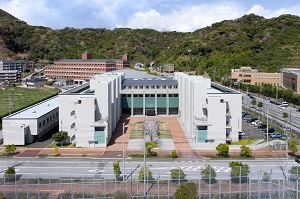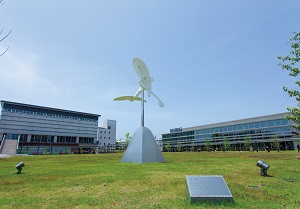本文
Policies ~Nutrition~
Admission Policy
The Faculty of Nutrition aims to develop specialists in nutrition and diet who understand the essential nature of people and health, and who are able to research “food” (the source of life) and contribute in order to enable people to live healthy lives.
Accordingly, the Faculty of Nutrition seeks the following types of students.
- People who have an interest in, and concern for, the local community, people, health, and“ food”, and who are motivated to learn further in this field (Interest/Motivation)
- People who approach things independently and proactively (Independence)
- People who have the basic knowledge and qualities needed to learn in the specialized areas of the Faculty of Nutrition, including scientific subjects that should be learned in high school (Knowledge/Cultivation)
- People who have a broad perspective and flexible sensibilities, and the ability to make appropriate judgments through logical thought based on past knowledge and education (Thought/Judgment)
- People who are conscious of being members of society, who are able to think from the perspective of others, and who have communication skills (Expression/Cooperation)
Curriculum Policy
In order for the students to achieve the Diploma Policy, the Faculty of Nutrition has established General Education and Departmental courses.
1 General Education courses
(1) In order for the students to acquire what is needed to function within a society that is fair to all, we have sets of courses through which students learn communication skills (i.e. Literacy courses), foundational knowledge of various areas of study (i.e. Foundational courses) and issues concerning local communities as well as international society (i.e. Theme-based Education courses), knowledge and skills for maintenance and promotion of lifelong health (i.e. Health and Sports courses), and practical initiatives to deal with regional issues centering around local communities (i.e. University-Community Partnership courses)
(2) English Communication courses are mandatory in years 1 and 2. Among the University-Community Partnership courses, the foundational courses are mandatory; the applied courses are elective. Other courses are chosen based on one’s own interests.
(3) Classes are, as much as possible, kept to small numbers, and methods of Active Learning are employed. Classes are conducted in diverse styles based on the content and special characteristics of each individual course. Meticulous evaluation of study is also carried out.
2. Departmental courses
In order to help the students develop into internationally and socially minded nutritionists, we have three sets of courses: Foundational, Specialist Field Basics, and Specialist Field. The courses in these sets are arranged sequentially from the basic stage, to the practical stage, to the advanced stage.
(Curriculum structure and educational content)
(1) The Foundational courses are set as complements to the other Departmental courses in order to help the students make progress on the necessary background knowledge and fundamental academic skills.
(2) Specialist Field Basics courses are for the students to secure the foundation they need to acquire knowledge and skills in their areas of specialization. The Specialist Field Basics are composed of three subsets in terms of educational content: Society, Environment and Health; Structure and Functions of the Human Body and Origins of Diseases; and Food and Health. The courses of Structure and Functions of the Human Body and Origins of Diseases, and the course of Food and Health are designed to deepen the students' understanding of humans and living; and the course of Society, Environment and Health provides the students with knowledge on society and environment, as well as health and dietary life.
(3) Experiments and practica are placed in the course of the Specialist Field Basics, with the aims to deepen the understanding of various educational contents and gain skills needed.
(4) The Specialist Field courses are for the students to deepen their expertise as nutritionists or nutrition teachers in various areas of profession. The Specialist Field is divided into six main courses in terms of educational content: Basic Nutrition Studies, Applied Nutrition Studies, Nutrition Education, Clinical Nutrition Studies, Public Nutrition Studies, and Food Service and System Management, as well as Comprehensive Seminars designed to develop the students’ comprehensive skills to all-around abilities to conduct nutritional assessments and nutritional management across the set of courses.
(5) Among the Specialist Field courses are Experiments and Practica with the aim of providing the students with the skills required of national registered dietitians.
(6) The Specialist Field courses, in tandem with Practical Trainings, are for the students to identify issues while working on their practical activities, as well as acquire skills in communication and presentation as a result of solving those issues. We strive to unify specialized knowledge and skills in conducting the required appropriate management, drawing on nutritional assessment and judgement.
(7) We also provide Industrial Internship for the students to gain work experience at companies, public organizations, etc., and Graduation Research for them to acquire skills to solve issues by experiencing the series of research processes.
(Sequence for course registration)
(1) Foundational courses are taken in year 1.
(2) Among the Specialist Field Basics are the course of the Structure and Functions of the Human Body and Origins of Diseases, and the course of Food and Health, both of which are taken mainly in years 1 and 2. The course of Society, Environment and Health is taken mainly in year 3.
(3) Courses in the Specialist Field are taken mainly in years 2 and 3.
(4) Practical trainings in the Specialist Field are taken in year 3.
(5) Industrial Internship and Graduation Research are taken in year 4.
(Methods of instruction)
(1) The students are provided with guidance regarding course registration through the Faculty of Nutrition Curriculum Structure Chart and Course Registration Model and the Faculty of Nutrition Course Registration Model (for a nutrition teacher), which describe the way the Departmental courses and the mandatory courses as well as recommended elective courses in General Education are organized.
(2) All the Departmental courses, except for Experiments and Practica, require the students to complete pre-practicum and post-practicum assignments as well as group work and seminars so that they will make proactive use of learning strategies.
(Evaluation)
For each course, specific goals are set of which the students are reminded, including information on the criteria and methods employed. We strive to guarantee the quality of education by evaluating and improving the curriculum in light of two types of student evaluation questionnaire: Class Evaluation Questionnaire and Nutritionist Technical Skills Attainment Level Questionnaire, the latter of which is a self-evaluation questionnaire and is conducted immediately before graduation.
Diploma Policy
We aim for the students to acquire both affluent education and attitudes to engage themselves with various social issues, to investigate food, i.e. the source of life, striving to understand the true nature of humans and health, thereby being able to contribute to people living healthy lives. The bachelor’s degree is awarded to the students who have acquired each of the following abilities.
(Knowledge and understanding)
1. The student, cultivated through a wide range of disciplines, is able to understand various issues in current globalizing society and special characteristics of communities therein.
2. The student has acquired the nutritionist-specific knowledge, skills, and learning methods for maintaining and improving health as well as preventing and curing injuries and illness.
(Ubiquitous and practical skills)
3. The student is able to collect, analyze, and organize the information required to solve various issues surrounding communities and thereby make suggestions for those issues.
4. The student has acquired a comprehensive set of qualities required of a national registered dietitian, including knowledge, skills, attitude, and ways of thinking.
(Attitude and orientation)
5. The student, as a specialist in nutrition and diet, shows aspiration to raise the level of his/her knowledge and skills throughout his/her life.
(Comprehensive learning experience and ability to think creatively)
6. The student understands public health and thereby is able to manage nutrition and meal provision services in the public health, medical care, welfare, and nursing-care systems.
7. The student is able to provide guidance on nutrition and diet for health promotion and for the primary, secondary, and tertiary prevention of disease.









